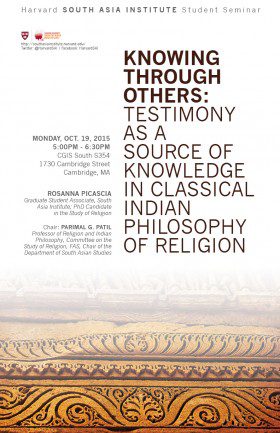GSA Seminar
Rosanna Picascia, SAI Graduate Student Associate, PhD candidate in the Study of Religion
Chair: Parimal G. Patil, Professor of Religion and Indian Philosophy, Committee on the Study of Religion, FAS, Chair of the Department of South Asian Studies
This talk will look at the debate among Sanskrit philosophers of religion over whether, and the conditions under which, testimony is a source of knowledge. In particular, it will focus on the epistemic status of scripture, the example par excellence of testimony. What makes scripture an interesting case to look at is that it often speaks about nonempirical objects, such as heaven, which are incapable of being directly verified. Moreover, the fact that scriptural testimony varies among different religious traditions poses a challenge to testimonially-based religious belief. This talk will explore the ways in which South Asian philosophers of religion in first millennium India approached these issues, while additionally drawing upon contemporary discussions in the epistemology of testimony.

